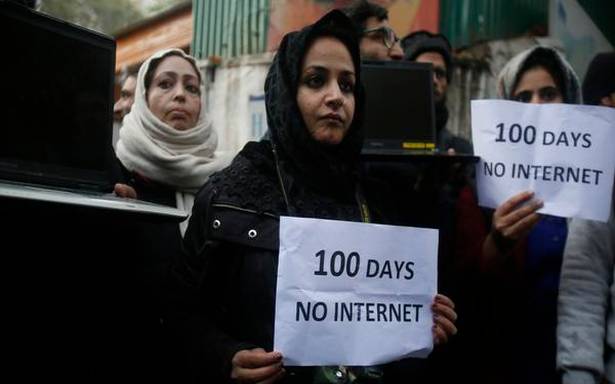Report suggests in-depth study of economic fallout of frequent shutdowns
There were no verifiable, centralised records of Internet shutdowns in the country. Neither the Ministry of Home Affairs nor the Department of Telecom maintain such a record, the parliamentary standing committee on information and technology pointed out in its report adopted on Tuesday.
The committee, headed by senior Congress leader Shashi Tharoor, pressed for a detailed study on the economic impact owing to frequent and prolonged Internet shutdowns.
Advocacy group Access Now, in a study published in March last, reported that India topped the list of countries that resorted to government imposed Internet clampdown.
The report, as per sources, said that in absence of the database there was no mechanism to review whether the Internet clampdowns followed the laid down rules or the Supreme Court guidelines.
Also read | Behind the great Indian Internet shutdown
It is equally revealing, the committee noted, there were no coherent rules dictating these shutdowns. On the grounds of maintaining “public safety” or in a scenario of “public emergency” the State governments have the right to impose an Internet clampdown. But the report, as per the sources, pointed out that “public safety” and “public emergencies” were not clearly defined. The Net shutdowns have been reduced as a “routine policing and administrative tool”.
Citing the example of Jammu and Kashmir, the committee stated that there should be a “standard operating procedure” in place to review from time to time a shutdown and it could not go on indefinitely. The government had first imposed a communication shutdown on August 5 2019 to quell anticipated protests after Parliament abrogated Article 370, under which it enjoyed special status. Access to slow, 2G Internet for mobile and fixed-line subscribers was restored in March 2020, but high-speed 4G access was restored only by February 2021.
Percolating effect
The report noted that the absence of Internet and regular telecom services also had a percolating effect. The Cellular Operators Association, in their submission to the committee, said that every hour of Internet/telecom shutdown cost them Rs. 25 million in every circle area. Apart from this, trade, which is now heavily dependent on Internet banking, also was strongly hit.
On January 10, 2020, the Supreme Court declared that freedom of speech and expression and freedom to practice any profession over the medium of Internet enjoyed constitutional protection under Article 19(1)(a) and Article 19(1)(g).
Quoting the judgment, the committee recommended that there should be an in-depth study on the economic fallout of this.
The importance of the Internet, the committee stressed, could not be overemphasised. “There is need to maintain a delicate balance between the citizen’s right to access the Internet and the State’s duty to deal with a public emergency,” the report asserted.
Source: Read Full Article

